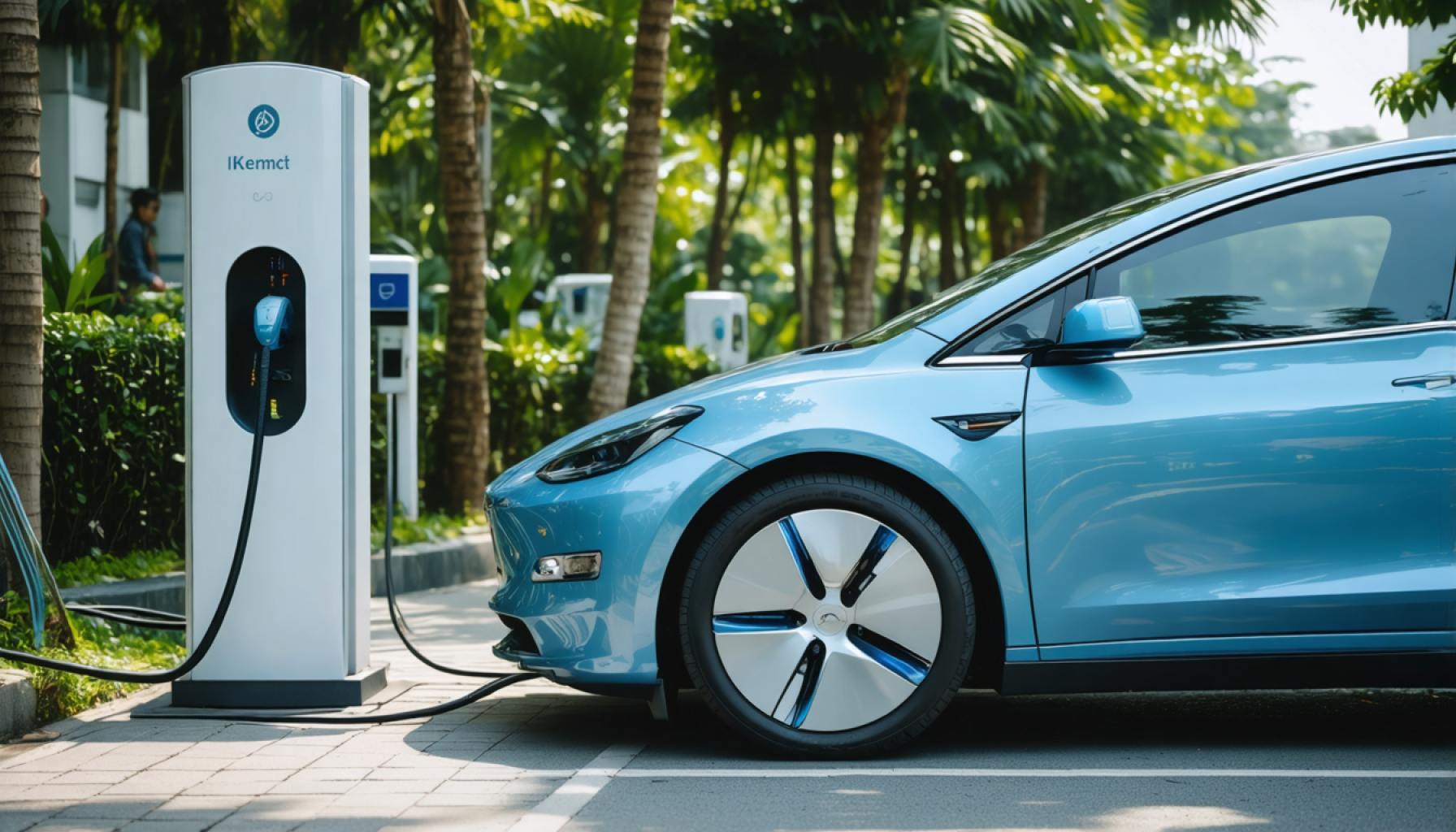- Sunwoda Automotive Energy Technology, part of China’s Sunwoda Electronic, is building a $1 billion EV battery factory in Thailand’s Chonburi Province.
- This investment marks a strategic partnership between China and Thailand to boost Thailand’s growing role in the electric vehicle sector.
- The facility will create over 1,000 skilled jobs, contributing to Thailand’s industrial and technological advancement.
- Thailand’s auto industry is evolving from traditional manufacturing to a leader in electric vehicle innovation in Southeast Asia.
- The factory will initially serve local markets with plans to expand into regional exports, enhancing Thailand’s presence in global EV markets.
- This development aligns with Thailand’s vision of economic resilience and environmental sustainability.
Amidst the dense, sweltering heat of Thailand’s Chonburi Province, a new chapter is unfolding that might well redefine the future of transportation in Southeast Asia. In a bold move that echoes the ambitions of the country to assert itself as a pivotal player in the electric vehicle (EV) revolution, Sunwoda Automotive Energy Technology, a subsidiary of China’s Sunwoda Electronic, begins construction of its monumental EV battery production facility.
With an investment exceeding a staggering $1 billion, this venture isn’t merely a testament to the growing synergy between China and Thailand but a strategic effort to enhance Thailand’s already flourishing auto industry. For years, Thailand has been the nucleus for conventional automobile manufacturing, with shiny assembly lines churning out products for global markets. Now, as the world pivots towards a greener future, Thailand aims to be at the heart of the electric transition in Southeast Asia.
Picture the state-of-the-art facility sprawling across the fertile lands of Chonburi. Upon its completion, it promises to employ over 1,000 skilled workers, a figure that is expected to rise significantly as the project scales. Not only does this translate into thousands of jobs, but it also heralds the transfer of cutting-edge technological knowledge – a vital component in the country’s roadmap to industrial advancement. As international companies continue to amplify their investments, the seeds of innovation and expertise are sowed into this tropical soil.
Thailand is not progressing in isolation. The country has been witnessing a surge in investments, particularly in 2024 when investment promotion reached its zenith since 2014, with the automotive sector claiming a notable position. Major Chinese EV manufacturers are laying down roots in the “Land of Smiles,” recognizing the strategic advantage of this hub in the ASEAN landscape.
The significance of this industrial metamorphosis extends beyond borders. The factory’s batteries will initially serve local markets but are poised to cater to a broader spectrum, driving regional exports and putting Thailand on the global map as a powerhouse in electric vehicular innovations.
As the machinery at Sunwoda’s facility gears up to commence production, the hum of progress resonates far and wide. For Thailand, this isn’t just another industrial project; it’s a leap towards future economic resilience and environmental sustainability. It’s a step to ensure that the majestic realms of Bangkok and the serene beaches of Phuket are complemented by a thriving green industrial ecosystem.
In embracing the electric tide, Thailand positions itself as a beacon of progress, showcasing to the world and neighboring nations that the future of transportation is not merely a distant dream, but a burgeoning reality nurtured in the heart of Southeast Asia.
Thailand’s Bold Leap Into the EV Future: What It Means for Southeast Asia
Key Insights Into Thailand’s EV Revolution
Thailand is rapidly positioning itself as a central player in the electric vehicle (EV) industry within Southeast Asia. With the recent groundbreaking of Sunwoda Automotive Energy Technology’s $1 billion EV battery plant in Chonburi Province, the nation is set to further cement its role as an automotive powerhouse—a title it has long held in the realm of traditional vehicle manufacturing.
How-To: Amplify Opportunities in Thailand’s EV Market
1. Explore Investment Opportunities: With the Thai government’s aggressive push towards EVs, investors should consider exploring partnerships and ventures in the EV and battery production sectors.
2. Upskill Workforce: As Sunwoda and other giants set up shop, locals can benefit from acquiring tech skills through education and vocational training in EV technology.
3. Engage in Sustainable Practices: Companies can leverage Thailand’s green industrial transition by adopting sustainable practices and reducing carbon footprints in their operations.
Real-World Use Cases
– Local Market Integration: Initially, batteries produced by the new plant will cater to domestic demand, supporting the fast-growing local EV market, which is poised for rapid expansion.
– Regional Export Hub: Strategically positioned in Southeast Asia, Thailand’s facilities will enhance regional supply chains, enabling exports to neighboring ASEAN countries, contributing to regional economic growth.
Market Forecast & Industry Trends
– Projected Market Growth: The EV market in Southeast Asia is expected to grow exponentially over the next decade, with Thailand at the forefront. By 2030, EVs could account for over 30% of the new car sales in Thailand, according to industry forecasts.
– China-Thailand Synergy: The collaboration between Chinese companies and Thailand signifies a burgeoning trend of China leveraging the strategic location and resources of ASEAN nations to expand its economic influence.
Controversies & Limitations
While Thailand’s move toward a green economy and EV adoption is lauded, there are challenges such as:
– Infrastructure Development: Expanding charging networks and developing sufficient electrical infrastructure are critical to support widespread EV adoption.
– Environmental Concerns: While EVs reduce emissions, the production and disposal of batteries involve environmental considerations that need addressing.
Insights & Predictions
– Thailand as an EV Hub: With its strategic location, skilled labor force, and government support, Thailand is likely to emerge as a leading hub for EV manufacturing in Asia.
– Rise of ASEAN’s EV Market: As other ASEAN countries like Indonesia and Vietnam ramp up their EV policies, the region is set to become a dynamic player in global EV markets.
Actionable Recommendations
– Invest in EV Infrastructure: Entrepreneurs and government bodies should prioritize developing robust charging networks and supporting technologies.
– Leverage Government Incentives: Take advantage of incentives provided by the Thai government to invest in the EV sector. These can include tax reductions and grants.
– Educate and Train: Continuous education and training programs should be established to empower a highly skilled workforce, vital for sustaining the EV industry.
Related Links
For further information on Thailand’s economic and industrial strategies, visit the <a href=https://www.boi.go.th/index.php?page=index Board of Investment of Thailand.
—
Through strategic investments and a collaborative approach with global leaders, Thailand is poised to transform into a pivotal force in the EV industry, paving the way for a sustainable economic upturn and environmental stewardship in Southeast Asia.







